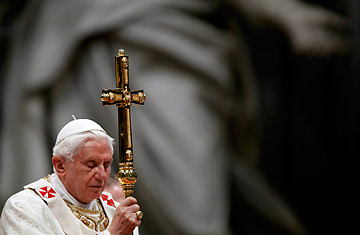
As a document, it hardly carried the gravitas of Martin Luther's Theses pinned to the door of the Wittenberg church. But when a British Foreign Office memo that lampooned Pope Benedict XVI was leaked on Sunday, it angered Britain's Catholics and strained relations with the nation's largest religious minority. While the uproar was short-lived, it caught an increasingly secular Britain by surprise and forced the country to take a hard look at the centuries-old tensions that still underlie public life.
The tract in question, a memo circulated to government departments in anticipation of the Pope's September visit to Scotland and England, was titled "The Ideal Visit Would See." It suggested the Pope should launch a line of Papal-branded condoms, bless gay marriages and encourage healthy living by doing somersaults with children. It also referenced the recent church sex abuse scandals by suggesting the Pope should "sack dodgy bishops."
British officials immediately apologized to The Vatican and British Catholics, while the Foreign Office said the memo was a "foolish attempt" at humor and had not been cleared by high-ranking officials before circulation. On the whole, prominent Catholics have offered a muted response; Charles Wookey, assistant general secretary of the Catholic Bishops' Conference, which formulates public policy on behalf of U.K. bishops, tells TIME that the memo represents "ignorance, not deliberate bias" towards Catholicism. In an op-ed piece in the Daily Telegraph, Cristina Odone, a former editor of the Catholic Herald newspaper, warned Britain's Catholics against being "po-faced and humorless" and suggested the memo be laughed off as nothing more than a bad joke.
But not all British Catholics share Odone's sangfroid. The memo incident came on the heels of several stories in the national press that many found offensive, including recent opinion pieces complaining about the cost of the Pope's visit, and, in early April, the news that lawyers working on behalf of the secular writer Christopher Hitchens are considering seeking an indictment against Benedict XVI for crimes against humanity. Some Catholics, such as Scottish composer James MacMillan, feel that this hostility toward the Pope's visit reveals that pockets of anti-Catholicism still exist in Britain, 476 years after Henry VIII broke with Rome so he could marry Anne Boleyn. "There is still knee-jerk anti-Catholic venom in the corridors of power," MacMillan says. "The hysteria being whipped up has shocked a lot of people."
Certainly, there are places in Britain where rumbling sectarian tensions continue to burst into periodic violence — Northern Ireland, and parts of western Scotland. But according to Dennis Sewell, author of Catholics: Britain's Largest Minority, relations between Papists and Anglicans have steadily improved since the Emancipation Act of 1829 removed the last legislation that held Catholics as second-class citizens (well, nearly the last — the 300-year-old Act of Settlement still says that an heir to the British crown cannot marry a Catholic). These days, the U.K.'s Catholics, who number around 5.5 million — or 10% of the population — rarely face overt discrimination. And yet, Sewell says, vestiges of anti-Catholic sentiment remain deeply entrenched in British culture. "The British establishment is incredibly politically correct — it would never be openly anti-Semitic, racist or Islamaphobic," he says. "Yet the one thing that is tolerated is anti-Catholicism. And that tells you something."
But Sewell adds that English Catholics, paradoxically, have also long had a strong foothold in world of the British elite. Catholics make up a sizable portion of what remains of the country's landed aristocracy, and the success of private Catholic schools such as Ampleforth College and Stonyhurst have secured places for many Catholics at Britain's top universities. Catholics have been proportionally represented in the House of Commons since 1997, Sewell says. Tony Blair practiced as a Catholic for the latter years of his premiership, but only officially converted after leaving office (probably for fear of upsetting the peace process in Northern Ireland, although some commentators suspect he feared upsetting his anti-Catholic Labour party).
Some suspect, though, that Catholics, like all religious citizens, are being pushed to the margins of public life. Many point out that the new generation of the British ruling class is increasingly populated by secularly educated, irreligious Brits who disdain Catholicism particularly because it so readily mixes religious doctrine with questions of public policy. MacMillan contends that Catholics are under fire from an "all-consuming and unattractive militant secular prejudice." Sewell says secularism became the default in the British government and civil service after the 9/11 attacks, when religion — particularly any that wishes to influence how societies are governed — became an object of suspicion. Wookey calls it "a matter of grave concern" to Catholics that "religion is now seen as one of Britain's problems rather than a solution to them."
At Westminster Cathedral, a Byzantine-inspired London church that serves as the heart of the capital's Catholic community, the devout seem to share Wookey's dismay at the fading of religion in Britain. After a recent afternoon Mass, several worshippers told TIME that they are concerned by what Stewart Meyer, 64, described as "the creeping secularization" of British society. As she left the hushed, dim interior of the church to join the pedestrians on the busy Victoria Street, Josephine McKenne, 72, said she felt her faith was under attack not from discrimination but "indifference." "When you are trying to live by God's law," she said, "Britain is a tough place to be."
